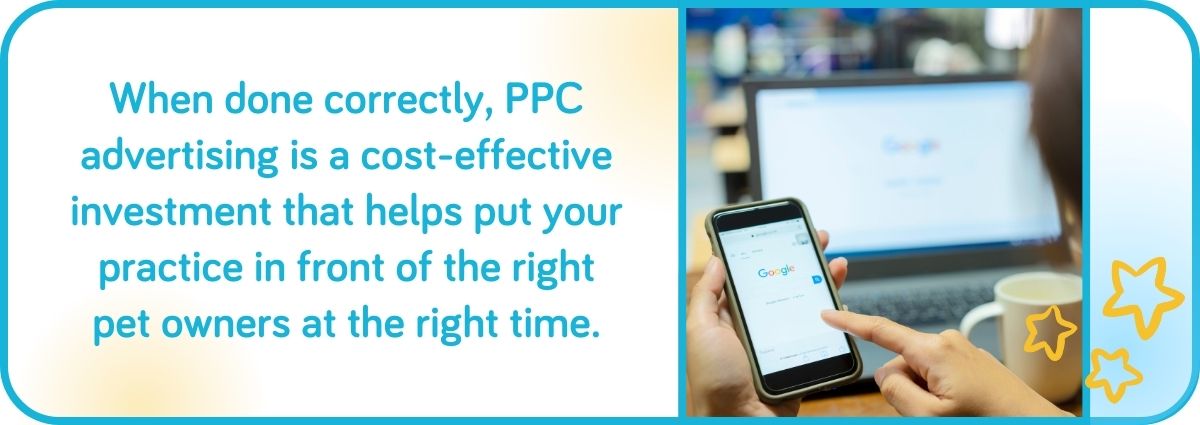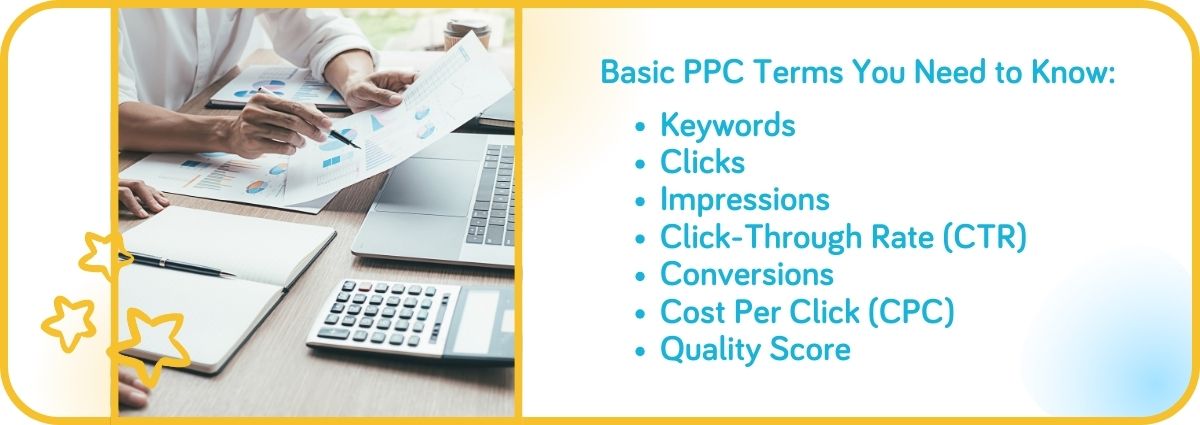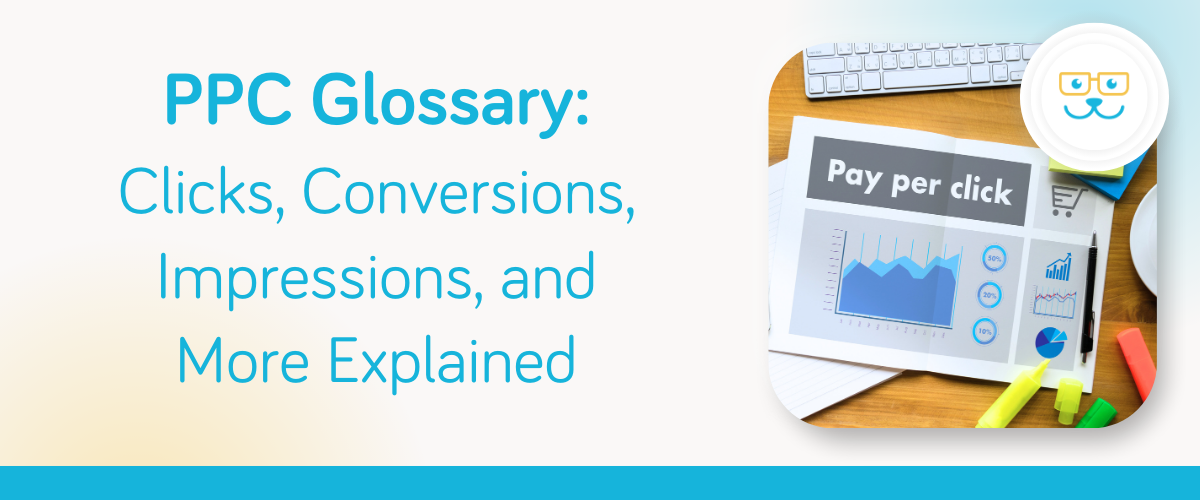PPC Glossary: Clicks, Conversions, Impressions, and More Explained
Veterinary practice owners interested in growth and new client acquisition are increasingly turning their focus toward digital marketing initiatives and are embracing the opportunities associated with online paid media advertisements, like Pay-Per-Click (PPC). According to HubSpot, 84% of brands and marketers said they see promising results with their PPC advertising campaigns, and you can too.
With PPC advertising, you can reach potential clients at the exact moment they're searching for veterinary services online. But diving into the world of PPC can be overwhelming, especially with all the industry jargon. That's why we're here to break it down for you in simple terms.

What Is PPC? And What Does it Do for Vet Practices?
PPC, or Pay-Per-Click, is essentially a digital advertising model where advertisers pay a fee each time their ad is clicked. When done correctly, PPC advertising is a cost-effective investment that helps put your practice in front of the right pet owners at the right time. It's like putting up a billboard on a busy highway, but you only pay when someone interacts with your ad. This leads to better audience targeting and more cost-effective outcomes. In fact, it’s been shown that optimized PPC advertising returns $2 for every $1 spent, on average — that’s a 200% ROI!
Need a crash course on the basics of PPC? Read our PPC Marketing For Veterinarians 101 guide for an in-depth look at PPC platform options, ad types, and targeting options that can help set your practice apart.
For veterinary practices, PPC can be an absolute game-changer when it comes to reaching your target audience and engaging ideal client personas. It allows you to target pet owners in your area who are actively searching for veterinary services and are often further along in the marketing funnel than your average organic leads. Whether pet owners are looking for routine check-ups, emergency care, or specialized treatments, properly executed PPC campaigns can put your practice front and center when potential clients are in need.
By investing in veterinary PPC, you can:
- Increase Visibility: Get your practice noticed by appearing at the top of search engine results pages (SERPs) when people search for veterinary services in your area. These results are different than those earned organically through SEO.
- Drive Traffic: Attract more visitors to your website, leading to more appointment bookings and inquiries about your services and offerings.
- Measure Results: Track the performance of your ads in real-time and adjust your strategy to maximize ROI.
Now that we’ve covered the foundation of what PPC is and why it can be so effective for veterinary practice, let’s get into the fun stuff: the most common terms you’ll need to know to get started with PPC and what they may look like in a real live campaign.
Basic PPC Terms You Need to Know

Keywords: These are the words or phrases that trigger your ads to appear when someone searches online. For example, if someone searches for "veterinary clinic near me," your ad could be shown if you're targeting that keyword.
Clicks: A click occurs when someone interacts with your ad by clicking on it. Each click represents a potential client visiting your website to learn more about your services.
Impressions: An impression is counted each time your ad is shown on a search engine results page or other online platform. It's a measure of how often your ad is viewed by potential clients.
Click-Through Rate (CTR): CTR is the percentage of people who click on your ad after seeing it. It's calculated by dividing the number of clicks by the number of impressions and multiplying by 100. A higher CTR indicates that your ad is resonating with your target audience.
Conversions: A conversion happens when a potential client takes a desired action after clicking on your ad, such as booking an appointment, filling out a contact form, or calling your practice. Conversions are the ultimate goal of your PPC campaigns.
Cost Per Click (CPC): CPC is the amount you pay each time someone clicks on your ad. It's determined by factors like keyword competitiveness and ad quality. More competitive and highly sought-after keywords will typically have a higher associated cost for each click, so it’s important to do your research before starting your PPC campaign so you can budget and track expenses appropriately.
Quality Score: Quality Score is a metric used by search engines to evaluate the relevance and quality of your ads and landing pages, though not all factors contributing to Quality Scores have been disclosed. A higher Quality Score can lead to lower CPCs and better ad placements. If your ads receive a low Quality Score, use this as an opportunity to revisit your ad’s content and keywords to ensure relevance and clarity. A little tweaking and workshopping can go a long way in creating a great PPC ad!
What These Terms Look Like in a Real PPC Campaign
Now that we’ve learned the basics of commonly used PPC terms, it’s time to put them to use!
For the sake of this example, let's say you're running a PPC campaign to promote your veterinary practice in Dallas. Here's a brief rundown of how these terms might play out in the real world:
Keywords: You target keywords like "Dallas vet," "emergency pet care," and "dog vaccinations" to reach pet owners in your area.
Clicks: Each time someone clicks on your ad after searching for one of your target keywords, it counts as a click.
Impressions: Your ad is shown hundreds or even thousands of times to pet owners in Dallas who are searching for veterinary services.
Click-Through Rate (CTR): Your ad has a CTR of 10%, meaning that 10 out of every 100 people who see your ad click on it to learn more.
Conversions: Out of those clicks, 50% of visitors schedule appointments at your practice, resulting in 5 conversions.
Cost Per Click (CPC): You're paying an average of $2 per click, depending on the competitiveness of your keywords and the quality of your ads.
Quality Score: Your ads have a high Quality Score due to their relevance to search queries and the user experience they provide, resulting in lower CPCs and better ad placements.
More Advanced PPC Terms for Digital Marketing Savvy Vets
Got the basics of PPC terminology down, but still want more? Get familiar with some additional PPC terms, including ad types, performance indicators, and more:
Ad Auction: The process by which search engines determine which ads to show and in what order based on factors like bid amount, ad quality, and relevance. It's a dynamic and competitive environment where advertisers compete for ad placements.
Ad Extensions: Additional pieces of information that can be added to your PPC ads to provide more context and encourage engagement. Examples include call extensions, location extensions, and sitelink extensions.
Ad Position: The placement of your ad on a search engine results page relative to other ads. Higher ad positions typically result in greater visibility and click-through rates, but they may also come with higher costs.
Ad Rank: A value used to determine the position of your ad on a search engine results page. It's calculated based on your bid, ad quality, and expected impact of ad extensions and other ad formats.
A/B Testing: A/B testing, also known as split testing, involves creating multiple versions of an ad or landing page and comparing their performance to determine which one is more effective. By testing different elements like ad copy, images, and calls-to-action, you can optimize your campaigns for better results.
Bid: Bid refers to the maximum amount of money you're willing to pay for a click on your ad. It plays a crucial role in determining your ad rank and placement on search engine results pages.
Bidding Types: Bidding types refer to the different strategies you can use to set your bids in PPC campaigns. Common bidding types include manual bidding, where you set bids manually for each keyword, and automated bidding, where bidding is handled automatically by the ad platform based on your goals and parameters. The bidding type best suited to your practice can be determined by your goals and availability to manage ads and campaigns.
Geotargeting: Geotargeting allows you to target your ads to specific geographic locations, such as cities, states, or countries. This enables you to tailor your messaging and offers to the unique needs and preferences of different regions.
Impression Share: The percentage of times your ad is shown compared to the total number of times it could be shown. It's a measure of your ad's visibility in relation to your competitors.
Landing Page: A landing page is the webpage that users are directed to after clicking on your ad. It's designed to provide relevant information and encourage visitors to take a specific action, such as making a purchase or filling out a form. A specific landing page relevant to your ad helps users focus on one thing on your website.
Negative Keywords: Keywords that you specify as not relevant to your ad campaign. By excluding these keywords, you can prevent your ads from appearing in irrelevant searches and improve the targeting of your campaigns.
Remarketing: Remarketing allows you to target users who have previously visited your website or interacted with your ads. By showing personalized ads to these users as they browse the web, you can reengage them and encourage them to take further action.
Return on Ad Spend (ROAS): A metric that measures the revenue generated from your PPC campaigns compared to the amount spent on advertising. It helps you evaluate the effectiveness of your advertising investments.
Return on Investment (ROI): ROI measures the profitability of your PPC campaigns by comparing the amount of revenue generated to the amount spent on advertising. It's calculated by dividing the net profit by the advertising cost and multiplying by 100.
Veterinary PPC Done Right with GeniusVets
PPC advertising can be incredibly effective when done right. But there is a lot of research, writing, optimizing, and managing that goes in to running a successful PPC campaign.
Ready to harness the power of PPC advertising for your veterinary practice? Let our experts guide you with a free demo of our proven PPC strategies. Get started today and see the difference it can make for your business.

